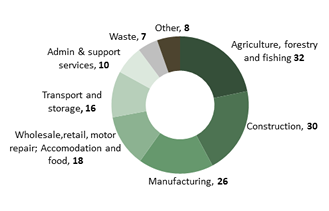HSE reveal 30 died in construction industry last year
This post has already been read 637 times!
Deaths in construction have fallen to thirty this year, most were from falls from height with the latest figured from the Health and Safety Executive (HSE).
HSE has today released its annual figures for work-related fatal injuries for 2018/19 as well as the number of people known to have died from the asbestos-related cancer, mesothelioma, in 2017.

The provisional annual data for work-related fatal injuries revealed that 147 workers were fatally injured between April 2018 and March 2019 (a rate of 0.45 per 100,000 workers).
There has been a long-term reduction in the number of fatalities since 1981. Although 2018/19 saw an increase of 6 workplace fatalities from 2017/18, the number has remained broadly level in recent years.

Following the release, HSE Chair Martin Temple commented:
“Today’s release of workplace fatality statistics is a reminder that despite the UK’s world leading position in health and safety, we cannot become complacent as we seek to fulfil our mission in preventing injury, ill health and death at work.”
The new figures show how fatal injuries are spread across the different industrial sectors:
- Agriculture, forestry and fishing, and Construction sectors continue to account for the largest share of fatal injuries to workers (32 and 30 deaths respectively in 2018/19).
The figures also indicate those sectors where the risk of fatal injury is greatest:
- Agriculture, forestry and fishing and Waste and recycling are the worst affected sectors, with a rate of fatal injury some 18 times and 17 times as high as the average across all industries respectively (annual average rates for 2014/15-2018/19).

HSE Chair Martin Temple commented:
“These statistics also remind us that, in certain sectors of the economy, workplace death remain worryingly high. Agriculture, forestry and fishing accounts for a small fraction of the workforce of Great Britain, yet accounted for over 20 per cent of worker fatalities in the last year. This is unacceptable and more must be done to prevent such fatalities taking place.”
“Whatever the sector, we should remember that any change in numbers provides little comfort to the family, friends and colleagues of the 147 whose lives were cut short this year while doing their job.”
The three most common causes of fatal injuries continue to be; workers falling from height (40), being struck by a moving vehicle (30) and being struck by a moving object (16), accounting for nearly 60 per cent of fatal injuries in 2018/19.
The new figures continued to highlight the risks to older workers; 25 per cent of fatal injuries in 2018/19 were to workers aged 60 or over, even though such workers made up only around 10 per cent of the workforce.
In addition, there were also 92 members of the public fatally injured in incidents connected to work in 2018/2019, approximately a third of which took place on railways.
Mesothelioma, which is contracted through past exposure to asbestos and is one of the few work-related diseases where deaths can be counted directly, killed 2,523 in Great Britain in 2017- a broadly similar number to the previous five years. The current figures are largely a consequence of occupational asbestos exposures that occurred before 1980. Annual deaths are expected to remain broadly at current levels for the rest of the decade before beginning to reduce in number.
A fuller assessment of work-related ill-health and injuries, drawing on HSE’s full range of data sources, will be provided as part of the annual Health and Safety Statistics release on 30 October 2019.


